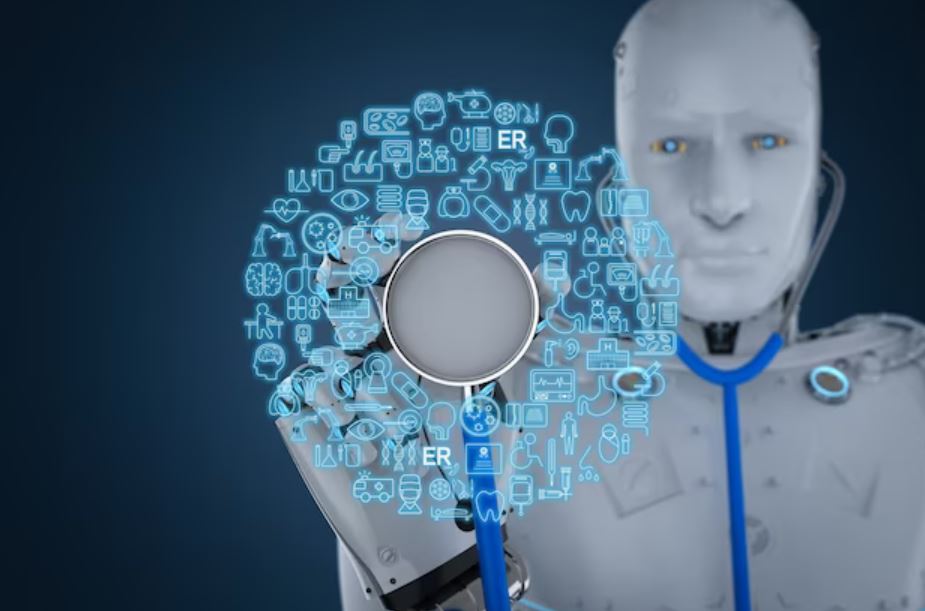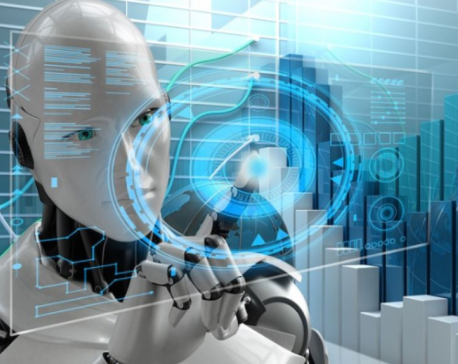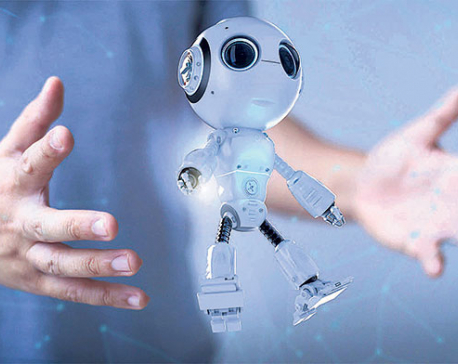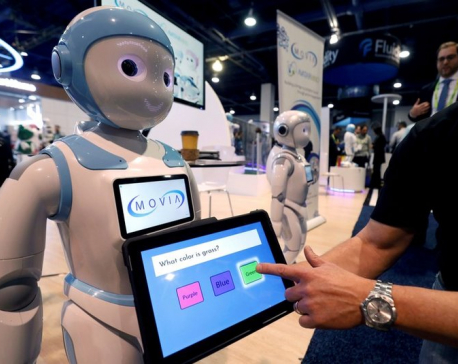
OR
Opinion
AI's impact on healthcare: Potential and ethical challenges
Published On: August 31, 2023 09:00 AM NPT By: Shreeyukta Aryal

The global spread of autonomous vehicles has increased the familiarity of the word "AI" (Artificial Intelligence). Nevertheless, this understanding may not apply to all industries or situations, such as healthcare, where AI has a significant impact. AI-powered autonomous vehicles have garnered attention in transportation. However, other sectors like healthcare, legal services, agriculture, and finance have yet to receive similar acknowledgment. Artificial intelligence is causing significant changes in healthcare through medication discovery, diagnosis, treatment, disease outbreak prediction, individualized medicine, and image analysis. Yet, the public may not fully understand AI's contributions to the medical field. To help more people understand the global impact of AI, we must raise global awareness.
The healthcare industry is at the center of a revolutionary shift due to AI's integration into its core operations. This technology-medical combo has the potential to revolutionize patient care, diagnosis, treatment, and research. But as AI permeates healthcare procedures, concerns about its impact on the industry and the moral ramifications of handing over crucial decisions to machines begin to arise.
The development of AI in healthcare offers several prospects with the potential to improve the effectiveness and quality of patient care. It enables medical practitioners to quickly analyze enormous volumes of data to make informed decisions, particularly in diagnostics. A previously unachievable achievement, an unbeatable extent of accuracy in medical image scanning is now possible via the integration of cutting-edge algorithms. By enabling early action and reducing the possibility of misdiagnoses, this precise information ultimately helps to save lives. Aidoc's AI-driven algorithms, for example, analyze medical images with astounding precision, assisting radiologists in finding minor irregularities that could escape human vision. This technology ensures prompt interventions and better patient outcomes by speeding up diagnostics. Similarly, PathAI uses AI to examine pathology slides and aids pathologists in making more accurate diagnosis of diseases like cancer. The IBM Watson for Oncology platform demonstrates how AI can offer specific treatment strategies for cancer patients by sifting over enormous quantities of medical literature and data. Another area where AI excels is in customized healthcare. DeepMind works with healthcare organizations to foresee patient decline and to enable preventative measures. AI's capabilities have expanded to include predictive analytics. The NHS and Google's DeepMind Health have collaborated to create an algorithm to forecast severe kidney injury up to 48 hours in advance. Healthcare professionals can now deliver timely treatments and perhaps save lives because of AI-driven insight. These real-world instances vividly illustrate AI's ability to improve medical practice, highlighting its importance in the ever-evolving advancement of healthcare.
AI has another fascinating ability known as predictive analytics, enabled by AI and can alter disease-preventive approaches. AI can predict epidemics and trends by analyzing large datasets and finding patterns, combining many data sources that AI to reveal connections and trends that indicate possible pandemics. It develops predictive algorithms to find similarities and recurrent signs in developing scenarios by learning from data from previous epidemics. As new trends emerge, real-time data analysis improves predictions, facilitating prompt interventions. The predicted outcomes act as early warning mechanisms, notifying health authorities to undertake treatments for previous epidemic trends. The administration of vast datasets and complex variables is made possible by AI's computing skills, which improves its capacity to identify subtle linkages underlying pandemic behaviors. The COVID-19 pandemic provides evidence of AI's ability to predict outcomes because it utilized international travel, infection rates, and population density to forecast the virus's spread. Predictive analytics, assisted by AI, essentially converts complex data into insights findings, enabling proactive reactions to patterns and outbreaks. Healthcare practitioners can reduce the strain on public health emergencies by successfully allocating resources.
In addition, the complexity of human biology and the variety of patient situations might be difficult for AI systems to cope with. AI models trained on regular instances may not be able to effectively detect illnesses or medical disorders that come with unusual symptoms. It gives rise to worries about the possibility of an inaccurate diagnosis and improper medical advice. Human biology is dynamic, which makes matters more difficult because the health state can vary over time. For precise insights, AI models must adapt by absorbing real-time data. AI faces difficulty in understanding emergent features, which are patterns that result from interactions between components.
Obstacles also arise from our incomplete knowledge of human biology. AI models must navigate uncertainty and adjust to new information while working with partial knowledge. Effective communication between AI specialists and medical experts is crucial - to ensure AI models align with medical knowledge and practices. The use of AI in healthcare will impact the medical profession. AI can enhance diagnosis, treatment ideas, and administrative duties; it may also change how doctors practice medicine. Doctors may need to evaluate insights produced by AI and make complex decisions instead of everyday tasks. Maintaining patient trust, dealing with moral dilemmas, and effectively working with AI systems will be crucial. AI requires constant training and process adaptations. Doctors will still be necessary because of their ability to contextualize data produced by AI, interact with patients, and handle difficult medical situations.
Regardless of the challenges posed by human biology, pursuing this endeavor remains intriguing due to its potential to transform patient care and advance medical knowledge. Even when making decisions that could mean the difference between life and death, there are certainly distinctions between healthcare AI and AI in other fields. The differences result from the complexity of human existence and the nuanced ethical considerations in healthcare. Healthcare AI must deal with complex medical histories, including patient states and human emotions, even though both scenarios include significant decisions.
The holistic strategy that healthcare AI requires contributes to its distinctiveness. It combines medical knowledge, patient values, and the complexity of diseases to make the most beneficial options. This complex interplay distinguishes it from autonomous vehicle situations restricted by predetermined algorithms. In simple terms, while healthcare AI and other AI areas entail decisions that could result in life or death, healthcare AI is distinct and particularly difficult due to the complex fusion of medical science, ethics, and individual characteristics. As we observe the growing use of AI in healthcare, it is essential to address the ethical issues associated with delegating important medical choices to algorithms. For patients to receive the best treatment possible, implementing artificial intelligence must adhere to moral principles that emphasize their health and well-being. Human supervision and engagement are necessary to guarantee that AI systems make ethical decisions accurately. Therefore, when considering delegating medical decisions to an AI system, it is vital to proceed cautiously and prioritize patient safety and well-being.
Data security and privacy are further issues raised by the implementation of AI in healthcare. Medical information and test reports are two examples of patient data that need to be protected as they are confidential. Retaining patient confidence involves ensuring that AI systems follow strict data protection guidelines. Data privacy laws vary widely, with some countries lacking comprehensive regulations.Data breaches in the healthcare industry may have serious repercussions. Patient data security is of the utmost importance in the modern era of electronic medical records and telemedicine. Data breaches may reveal confidential medical information, thus increasing the risk of identity theft, fraudulent activities, and blackmail. Implementing helpful technologies can become rigorous if patients lose trust in technological healthcare systems.
The main question is whether it is safe to entrust critical healthcare decisions to AI. The solution involves recognizing AI's strengths and weaknesses in an integrated approach. Medical practitioners may find AI a functional tool for research, diagnosis, and treatment strategies. But the human aspect must always be a priority. Instead of replacing human expertise, AI should act as an additional aid or tool. AI advancements in healthcare have enormous potential to revolutionize patient care, diagnosis, and treatment. Predictive models powered by AI will foresee illness epidemics, enabling quick responses. Personalized medicine, which adapts medications based on particular genetic profiles and health information, will become the norm. The ability of AI to analyze vast medical data can help improve the accuracy of early disease identification and prognosis by detecting trends and insights that human specialists may overlook. AI guided surgical robots will reduce invasiveness and recovery periods. AI-powered chatbots will also provide immediate medical guidance and help with mental health. It is essential to address ethical concerns regarding algorithm transparency and the protection of patient information. Integrating AI developments into healthcare can enhance patient outcomes and spark discussions about ethics and human-AI synergy.
Any emerging AI-driven healthcare initiative must prioritize data privacy due to its critical importance in preserving trust, protecting sensitive information, and keeping ethical guidelines. Medical records, genetic data, and treatment outcomes are private and sensitive information. Strong data privacy safeguards are necessary to prevent unwanted access, data breaches, and abuse of this data. Patients require reassurance that their personal information is protected ethically and securely. Strict data encryption, access controls, and anonymization methods must be employed to balance medical improvements with individual privacy. Breaches jeopardize patients' confidentiality and undermine trust in healthcare and AI systems.
Health providers must maintain control over health data due to ethical reasons. Patients can provide consent for data use, and privacy standards ensure they are aware of their rights. Maintaining patient trust is crucial for promoting AI healthcare acceptance and the development of helpful technologies. The usage of AI in the healthcare sector is an advancement with the potential to revolutionize patient care, diagnostics, and medications. Its prediction ability and analytical skills enable early detection and individualized treatments. Ethical considerations, data privacy regulations, and a comprehension of the complementary role of AI in conjunction with human expertise should all be taken into action when considering whether to entrust AI with critical medical decisions. Healthcare can harness the potential of AI while maintaining the core values of empathy and human-centered care by striking a balance.
You May Like This

Brewing Insights: AI's Journey Through Nepalese Research Landscape
For us Nepalese, tea or coffee time in the mornings is intimate for many reasons, one being a gateway to... Read More...

Should we be worried about AI?
On January 2, the BBC reported about a study regarding the use of artificial intelligence in making medical diagnosis. The... Read More...

'AI' to hit hardest in U.S. heartland and among less-skilled: study
WASHINGTON, Jan 24: The Midwestern states hit hardest by job automation in recent decades, places that were pivotal to U.S.... Read More...











Just In
- Challenges Confronting the New Coalition
- NRB introduces cautiously flexible measures to address ongoing slowdown in various economic sectors
- Forced Covid-19 cremations: is it too late for redemption?
- NRB to provide collateral-free loans to foreign employment seekers
- NEB to publish Grade 12 results next week
- Body handover begins; Relatives remain dissatisfied with insurance, compensation amount
- NC defers its plan to join Koshi govt
- NRB to review microfinance loan interest rate








Leave A Comment